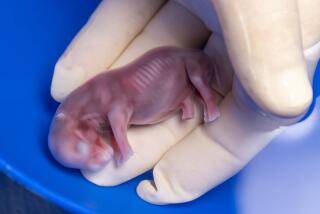Birth-Control Device Implanted : Orangutan Glut Forces Maxine to Have Surgery
- Share via
Not to plague you with yet another worry, but there’s been a population explosion among orangutans in the zoos of America.
Because of the orangutan glut, a special committee of the American Assn. of Zoological Parks and Aquariums last month declared a moratorium on the breeding of the “orangs,” as zoo folks affectionately call the sleepy-eyed, long-armed members of the ape family.
And so it was that Wednesday morning, a team of veterinary surgeons at the Los Angeles Zoo performed an operation that will help defuse that explosion.
Maxine--a plump, dark-eyed, auburn-haired 18-year-old who is generally considered the homeliest of the zoo’s 12-member family of Borneo orangs--was implanted with a time-release birth-control device that will render her infertile for as long as two years.
As Zoo Director Dr. Warren Thomas explained after the operation, it was especially important to put Maxine on the pill, so to speak, because however homely she may appear to humans, she is virtually irresistible to male orangutans. Maxine has given birth to four baby orangs in recent years, the latest on March 27.
An otherwise pleasant and good-natured creature, Maxine has one failing, her keepers say. While Maxine is quite fond of the activity that produces baby orangutans, she is not in the least bit fond of the babies themselves.
“She delivered the baby, took one look at it and walked off and left it,” Thomas said. Fortunately, according to Thomas, Maxine’s mother, a 34-year-old called Flakkee, is a wonderful grandmother and adopted her abandoned grandson.
Wednesday’s surgery on Maxine took just 22 minutes. An intern veterinarian, Christine Santiago, made an inch-long incision and inserted the birth-control device--a waxy capsule about the size of a short piece of classroom chalk--under the ape’s skin.
The capsule contains a drug called melengesterol acetate that slowly secretes a hormone-like material that inhibits the animal’s ovulation cycle.
Thomas explained later that Maxine and three other still-nubile orangs at the zoo have been implanted with the contraceptive device because orangutans have bred and birthed so successfully in American zoos over the last 40 years. As a result, there is now a surplus of the animals and a shortage of space in which to keep them
In the wild, however, they are an endangered species.






